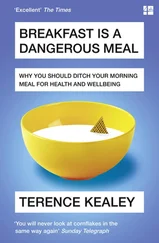The next day Sarah puts the Zovirax from Melanie’s medicine cabinet in her pocket. It is a very small piece, she figures, of what this family owes her.
Wednesday, two p.m., she announces she’s going to the neighbor’s for an egg.
“You can’t,” Bea says. “Grayson is sleeping.”
“You’ll stay here and watch him.”
“I can’t do that.” Bea flashes a big grin. She thinks Sarah is kidding.
“Sure you can. Just sit here and wait. If he cries, go upstairs and talk to him. He won’t, though. I’ll be back in a bit.”
“What’s a bit?”
“Ten minutes,” Sarah says.
Bea looks at the big grandfather clock she can’t read. “I want to go with you.”
“You’ll be fine here. You have to stop panicking about being alone. It’s no big deal. I was alone all the time at your age.”
“You were?”
“Yeah, sometimes overnight.” Sarah stops herself from saying more, in case Bea repeats this to Melanie.
“Okay.” Bea sits down on the couch and crosses her legs, her tiny hands cupping her tiny knee.
Outside Sarah stands in the bushes next to a window sneaking looks into the living room, where Bea sits rigidly, glancing repeatedly at the clock. After two minutes, she looks at the TV remote lying on the end table. House rules: no more than two hours a day, and that’s reserved for an hour after nap time and an hour after dinner, for Melanie and Aaron to grab some quiet time.
At Bea’s age, Sarah watched a lot of TV because TV hours are different. Faster. Fuller. They make it easy to pretend your mother is in her room napping and they count the day for you. When the shows about evil twins and men saving women from kidnappers come on, it’s lunchtime. The news: dinnertime. Shows with men on a stage telling jokes: bedtime.
Very slowly, as if Bea is afraid the remote will bite her, she picks it up and turns on the set. It springs to life with a happy brown-haired woman talking about how to grow a vegetable garden. Bea taps at the remote until Tom and Jerry appears, then scoots back on the couch and relaxes.
Good girl, Sarah thinks. These are the things you have to learn.
She thought she would know him. Only now does she realize she’s been picturing his robes, his desk, the great seal of the state of Ohio behind him, but not the man himself.
He’s short, 5’7” or 8”, her eye level. His right cheek is mottled light and dark in large, irregularly shaped patches and she knows instinctively this is a disease or defect of some kind. It will get worse. Do they hurt? No, she decides. Maybe unsightly, even embarrassing, but they do not cause physical pain.
“Hi, I’m Melanie’s dad. Did she tell you I was coming by?”
Sarah eyes the Judge, then looks behind her toward the kitchen, where Beatrice and Gray are eating lunch, to reinforce her role: she is the one in charge.
They hear his voice and Beatrice comes running down the hall. “Grandpa!”
He hauls in a dirty canvas bag filled with tools. “Mel say’s you’ve got no water pressure in the kitchen. I’m going to take a look.”
He removes a small screen from the spout’s end and cleans out a buildup that looks like hardened baking soda. “Mineral deposits,” he explains. “Mostly calcium.” Getting rid of it doesn’t help the pressure, though, so he heads down to the basement to shut off the water. “I’ll have to replace the valves.”
Sarah empties the sink cabinet, stacking the cleaners and plant food out of Grayson’s reach. The Judge lies on his back, reaching into the cabinet over his head. The knees of his jeans are white with wear and a triangle of hairy flesh shows where his old button-down pulls free of his belt.
“Can you hand me the wrench with the red handle?”
She looks in the bag for anything with a red handle.
“These are pliers.” He hands them back. “The wrench is the one with the round head.”
They work like that for an hour, the Judge asking for various tools and a cookie sheet to protect the back of the cupboard. “I’m going to use the blowtorch to solder this in, so keep the kids away.”
Bea asks what a blowtorch is and when her grandfather explains, she says, “I already got burned today.”
Sarah stiffens.
The Judge slides out of the cabinet and sits up. “You were? What happened?”
Bea presents her leg. “I was cooking.”
That morning Bea and Sarah made cookies, another food of uncountable raw ingredients and indeterminate portions which makes it easy to squirrel a few away in her tote. Sarah had explained the oven’s heat, showed Bea how to use a potholder, but Bea leaned on the door while taking the cookies out. To her credit, she didn’t even cry. Good girl, Sarah told her. Brave girl. You’ll know better next time. You’ll be more careful. Pain is an efficient teacher. Fortunately Bea doesn’t repeat these words to her grandfather.
The Judge kisses the red line on her knee. “Ovens are hot. Nothing for little girls to mess with.” Then he winks at Sarah, assuming Bea being near the oven was an accident.
•
“So what was it like,” Sarah asks Melanie, “having your father be a judge?”
Melanie shrugs. “There were a few interesting moments.”
“Like what?”
“This one time, I was maybe seven or eight, and these people were upset about a ruling Dad made on an abortion clinic. They were protesting in front of our house, this house, actually.”
This is Melanie’s family house. Her parents gave it to Melanie and Aaron two years ago.
“My mom had the twins in the bath, so my brother Tim and I were watching this out front and trying to figure out what was going on. The people had signs with fetuses on them and stuff like ‘Cuppernell kills babies.’ Finally Tim, who was just starting to read, goes into the bathroom and asks my mother, ‘Does Daddy murder babies?’
“My mom loves to retell that story,” Melanie says. “She always says Tim was waiting until he’d been told what to think of this act Daddy supposedly performed, ready to side with him in case it turns out killing babies is something Daddy is supposed to do.”
“So what happened?”
“Mom locked us in the house and marched outside and told the people she had four children in there and they were scared and could read those signs and could those people please go.”
“Did they?”
“Yeah. They actually apologized. My mom always said it was because they never thought of Dad as someone with four little kids of his own. I guess they thought that meant he was a good guy.” Melanie shrugs again. “I never did figure it out. I mean, if it was so easy to give up, why had they come?”
The next day Sarah Googles Aaron, Melanie, the Judge and his wife. Wife: zero hits. Melanie and Aaron: two each. Judge Grayson Cuppernell: five thousand eight hundred and twenty-four.
As the leaves redden and fall, Sarah works her way through. Most are official documents and news articles of little significance, but she feels increasingly powerful with the gathering of his facts. Where he went to law school and college. What year he graduated. Newsworthy cases. One day she finds an article about a gavel he gives to kids finalizing adoptions. The other judges who do adoptions — it’s called “Probate Court” Sarah learns — give them too. The article shows Judge Cuppernell handing the gavel to a pretty white girl being adopted by her uncle. Sarah stews on this. Gavels are a symbol of power. Instead of pretty white girls with nice uncles they need to give them to children being put in foster care, something to slam and say, “No! Order, order in this house!” Or they could give them to kids aging out. You are your own parent now. Call your life to order.
The lessons continue. Sarah teaches Bea how to slice the neck of a banana laterally so the top won’t bruise. She teaches her how to mix Grayson’s formula and change his diaper, how to crack an egg and how to set the heat level on the stove. “Five is usually good. If you aren’t sure, choose five.” It’s too soon for spaghetti, pouring out the boiling water too dangerous, but she teaches her how to make rice, which Sarah used to put in her mother’s shopping cart by the five-pound bag.
Читать дальше












